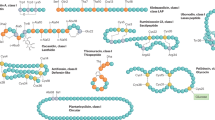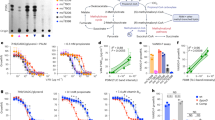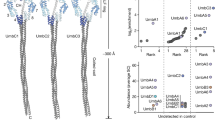Abstract
WE have carried out comparative investigations concerning the metabolism of lactose and its constituent monoses in liquid cultures of E. coli. Koser's synthetic medium was used. Samples were evaluated after incubation of 0, 6, 12, 24, 48, 72 and 96 hr. at 37° C, for increase of bacterial mass (nephelometrically), pH, and changes in the medium concerning the reducing compounds. In the chromatographic technique we used, as solvents, butanol–pyridine–water in the proportion of 45 : 25 : 40. To reveal the spots of reducing compounds, a modified silver nitrate test was used. The intensity and size of the spots developed were a measure of the concentration of the substrates in the medium.
This is a preview of subscription content, access via your institution
Access options
Subscribe to this journal
Receive 51 print issues and online access
$199.00 per year
only $3.90 per issue
Buy this article
- Purchase on Springer Link
- Instant access to full article PDF
Prices may be subject to local taxes which are calculated during checkout
Similar content being viewed by others
Author information
Authors and Affiliations
Rights and permissions
About this article
Cite this article
OPIEŃSKA-BLAUTH, J., MADECKA-BORKOWSKA, I. & BORKOWSKI, T. Comparative Studies on the Metabolism of Lactose, Glucose and Galactose in Liquid Cultures of E. coli. Nature 169, 798–799 (1952). https://doi.org/10.1038/169798a0
Issue Date:
DOI: https://doi.org/10.1038/169798a0
Comments
By submitting a comment you agree to abide by our Terms and Community Guidelines. If you find something abusive or that does not comply with our terms or guidelines please flag it as inappropriate.



